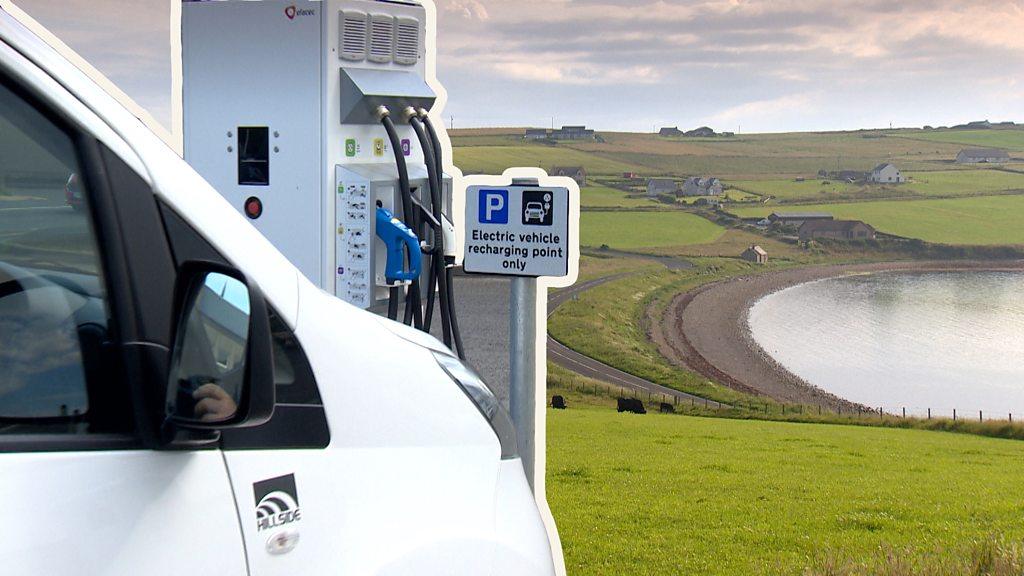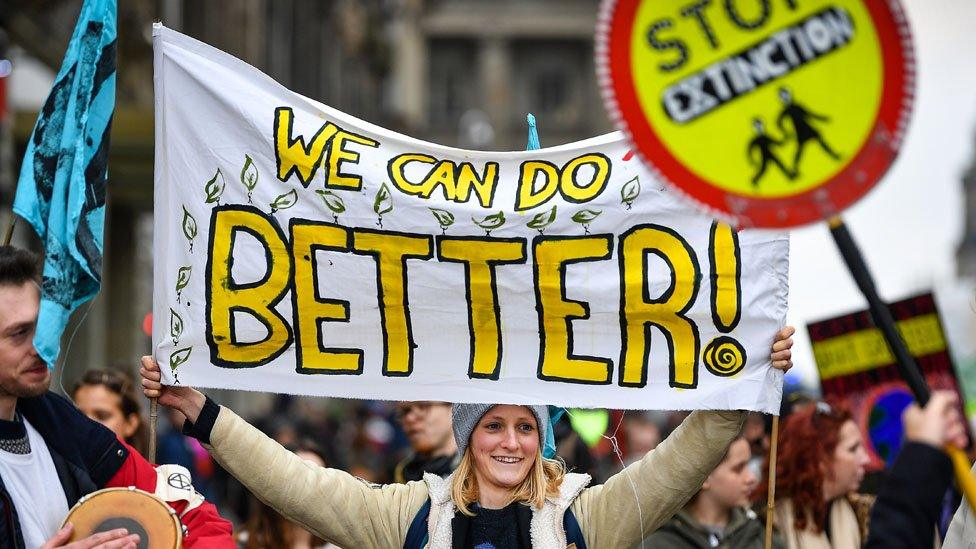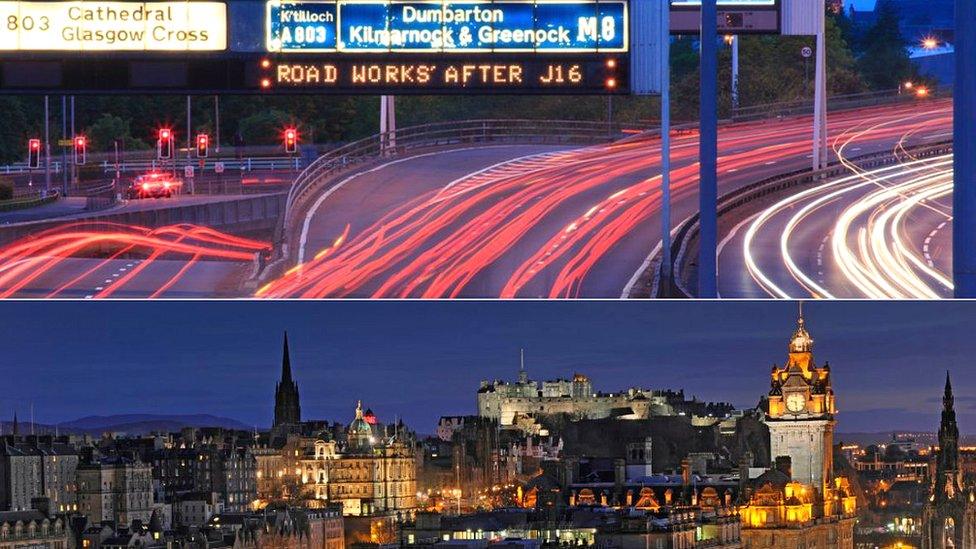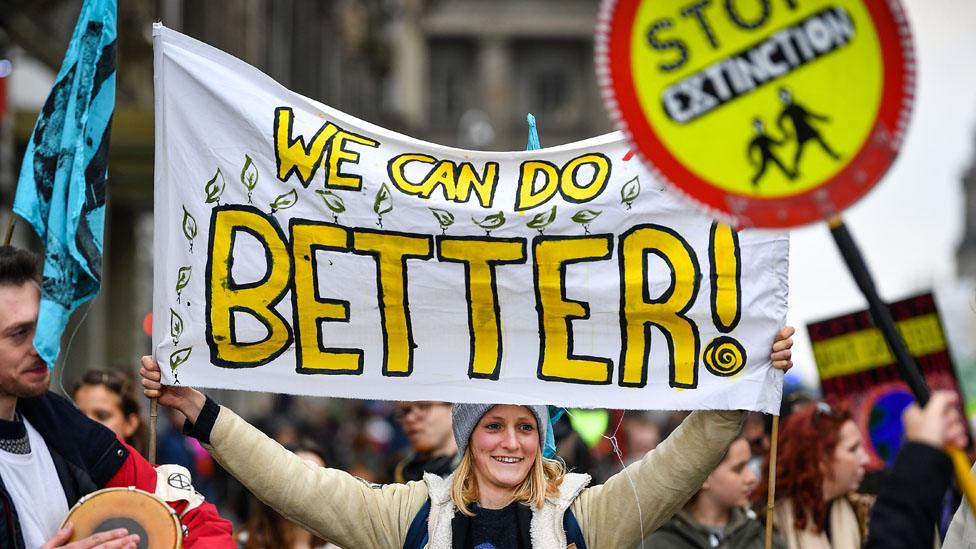Is Orkney 'in the fast lane' on electric vehicles?
- Published
Electric vehicles account for more than 2% of all cars and vans on the road in Orkney
Orkney is leading the charge on electric vehicles, with one of the highest uptakes in the UK. As BBC Scotland continues its season of special news coverage on the "climate emergency", we look at changes needed in transport and what could be learned from islanders.
When it comes to energy, Orkney is in the fast lane.
The islands produce more power than they're able to consume, so diverting some of that into electric vehicles (EVs) seems an obvious move.
The likes of the Nissan Leaf or Renault Zoe are a more frequent sight here than any other part of Scotland - you'll even see the odd Tesla.
But despite their prevalence, are people here really bought in?

The idea of owning an electric vehicle in the future appeals to newly qualified driver Charlotte Baird
For newly qualified driver Charlotte Baird from Houton, EVs offer the environmental credentials that many young people seek.
But their hefty price tag can mean they are financially out of reach. Charlotte's petrol car cost her just £600.
On an EV test drive she told me: "This is a lot more smooth and a lot less noisy.
"It will also help the local environment because there's no pollution.
"When I get the money I'll come and get one. Maybe when I've been to college and I've got a few years under my belt."

The council in Orkney has been able to pack lots of charging infrastructure into a relatively small area
You might think plug-in cars would best be suited to city driving where average journeys are just a few miles.
But despite being rural and remote the longest journey in Orkney from north to south is about 60 miles.
So the council can pack lots of charging infrastructure into a relatively small area.
Orkney now has well over 200 fully electric vehicles, more than 2% of the total cars and vans on the road.

It costs about £2/£3 to travel 100 miles in a fully electric car compared with £10 or more for petrol or diesel
Most of them have been sold by Jonathan Porterfield, from his business Ecocars, based at home near Evie.
He believes interest is growing fast and says some customers even buy online, without a test drive.
"The demand has just gone off the scale in the last 12 to 18 months as more and more people realise that this is an option," he said.
"People just want to get into an electric car, initially to save money but then for the feel-good factor of doing their little bit for the environment as well."
Orkney Islands Council claims to have one of the highest proportions of electric cars in the country.
Energy pioneer

Orkney is home to what is thought to be the first fully electric vehicle in Scotland to be converted into a motorhome
For our journey, I travelled in a fully electric vehicle thought to be the first in Scotland to be converted into a motorhome.
Owner Paul Hudd, from JP Orkney, explained: "People have fed back how easy it is to drive an electric vehicle, how easy the automatic gearbox is.
"From a camping perspective they like the fact that it fits into the environment really well."
Orkney has long been a pioneering place when it comes to energy.

The longest journey in Orkney from north to south is about 60 miles
Wind power to the national grid started here in the 1950s and in the last decade they've been harnessing the waves and tide.
The local authority is even trialling electric vans with hydrogen tanks which can charge the battery on the move and extend the range.
While public charging is free across Scotland, here that incentive has just been abolished.
But it still costs only £2/£3 to travel 100 miles in a fully electric car compared with £10 or more for petrol or diesel.
"As you put the infrastructure in, the costs need to be met, whether that be electricity, maintenance, fees and charges etc. It's many tens of thousands of pounds," said Darren Richardson from Orkney Islands Council.

The council in Orkney has now introduced a fee for recharging
"What the council has done is take a decision to introduce a charge. Not to make any profit. It's just a cost recovery model.
"At the moment we're supported by government in terms of the capital costs - the cost of putting in the chargers - and we hope that continues.
"But it's inescapable there is a running cost and I think that's an area we need to look at very closely because we want this to grow and we want it to be incentivised so that people continue to use electric vehicles.
"Councils generally face challenges financially and we need to recover costs unless they were subsidised by government."
Changing behaviour
But how will large scale behaviour change come about?
Prof Iain Black from the University of Stirling explained: "We're all lazy and we'll change to those things when we have to and when it's no longer convenient for us.
"That's where the government comes in, in making it much more convenient for us to drive electric cars and also putting a lot of pressure on the businesses, the car manufacturers, to develop the machines that we need."
Electric cars are clearly still a specialist vehicle. But Orkney offers a window into the future for all of us.
With manufacturers already planning for a tipping point away from fossil fuels, the question is not "if" but "when" it will happen.

BBC Scotland News is running a season of climate change coverage across radio, TV, online and social media.
- Published13 August 2019

- Published12 August 2019

- Published9 August 2019

- Published27 November 2023

- Published30 July 2019

- Published15 May 2019

- Published2 May 2019
